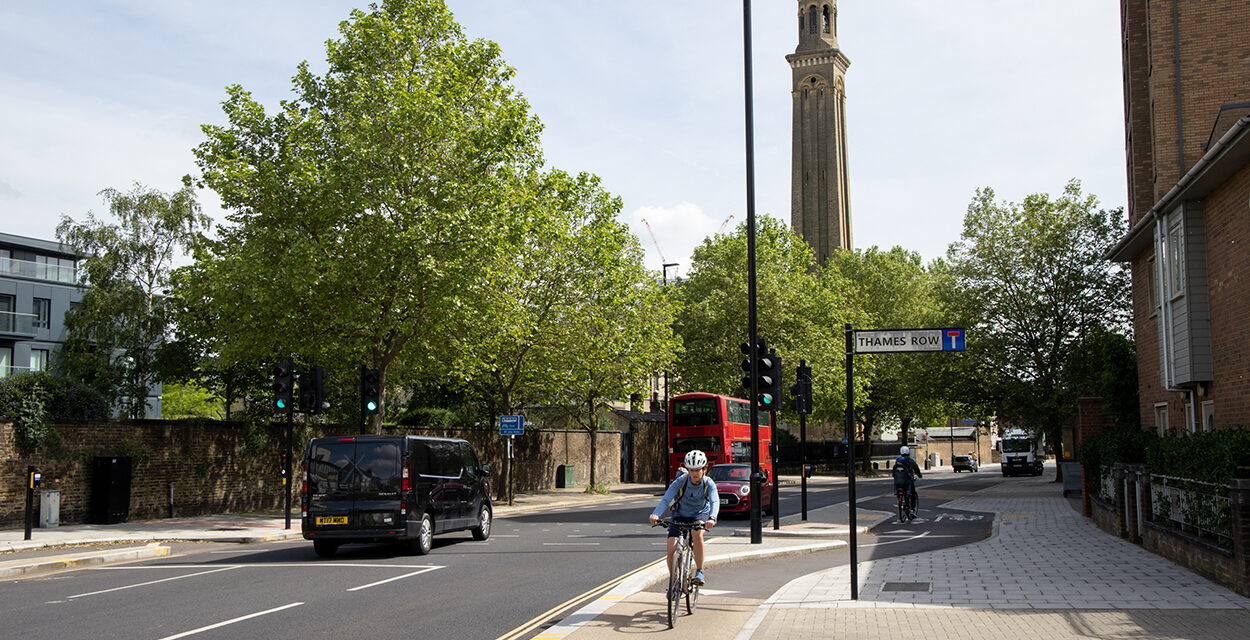London’s Cycleways network reached a key milestone this week, as the expansion of eight Cycleways across the capital means the total network is now more than 400km. As part of the Mayor of London and Transport for London’s (TfL’s) commitment to making cycling around the capital safer and easier, the network has more than quadrupled in size from just 90km in 2016. This expanding cycling network plays a vital role in ensuring that Londoners can travel safely and sustainably, and helps to tackle air pollution, congestion and the climate crisis, improving the health and wellbeing of people in neighbourhoods across the capital.
Last week, TfL published new data which shows that road fatalities have reduced by 30 per cent in London compared to seven per cent for the rest of Great Britain*. Improvements in infrastructure, including new Cycleways, are key to further reducing danger on the capital’s roads.
The newly created or upgraded Cycleways include new sections of protected Cycleway on busier roads, as well as sections delivered on quieter residential streets, with clear signage to make navigation easier. The success of London boroughs in reducing traffic and speed limits on residential streets continues to enable this vital expansion of London’s Cycleway network.
The recently launched Cycleways that further expand the network in London include:
Advertisement
Cycleway 9 – Kew Bridge to Brentford
A 1km extension of fully protected route in Hounslow from Kew Bridge to Brentford, connecting C9 to C40
Cycleway 6 – Chalk Farm to Hampstead
A fully protected 1.25km extension of C6 in Camden along main roads linking to Camden Town’s markets
Cycleway – Chalk Farm to Swiss Cottage
A 1km route in Camden linking to C6 along quieter residential streets, connecting Primrose Hill and passing next to The Roundhouse venue
Cycleway – Kentish Town to Hampstead Heath via Gospel Oak
A 1.8km Cycleway which now enables people cycling to travel direct from Kentish Town to Hampstead Heath along quieter residential streets, linking to Queen’s Crescent Market, Gospel Oak station and Parliament Fields
Advertisement
Cycleway 27 – Marylebone to Clerkenwell
Significant upgrades to the existing protected cycle lanes in Camden along Tavistock Place and Torrington Place to double the capacity, making cycling safer and alleviating congestion. The route links to Tottenham Court Road, The British Museum and University College London campus
Cycleway – Colliers Wood to Wimbledon
A 3.67km Cycleway in Merton along quieter residential streets linking these two important town centres along with their transport hubs
Cycleway 25 – Leytonstone to Queen Elizabeth Olympic Park
A new 2.83km Cycleway in Waltham Forest with protected cycle tracks on Grove Green Road, connecting with C26 at Queen Elizabeth Olympic Park
Cycleway – Ilford to Gants Hill
A new 1.68km Cycleway in Redbridge connecting to C42 – this route follows quieter streets, where 20mph speed restrictions and traffic calming measures have been implemented as part of the scheme. The route has also created a section of protected cycle track close to Ilford Station and the Exchange shopping centre
Advertisement
The Mayor of London, Sadiq Khan, said: “London’s rapidly expanding cycle network is helping people get from A to B safely and sustainably, and is enabling hundreds more Londoners to try cycling. I’m delighted that these recent improvements mean Londoners living and working across our city – from Hounslow to Camden, Redbridge to Waltham Forest – will now benefit from new Cycleways.”
Helen Cansick, TfL’s Head of Healthy Streets Investment, said: ”We are excited to see a network of Cycleways continuing to emerge across London, helping unlock safer and more accessible cycling to even more Londoners. These high-quality cycling networks bring a range of benefits to local communities, and we are continuing to work closely with boroughs and invest in further active travel schemes. We look forward to continuing our work to enable Londoners easy access to our cycle network.”
Sarah Javaid MBE, CEO of Cycle Sisters said: “We really welcome the expansion of London’s Cycleways to help make cycling safer. We often hear from our network of women that safety fears are one of the key barriers to cycling so high quality and connected cycle networks are vitally important to make cycling more accessible. Alongside this, we’re keen to keep working with Transport for London and other partners to ensure that the benefits of cycling reach all communities through investment in initiatives such as cycle training and social led rides.”
Oli Ivens, London Director for Sustrans, said: “We warmly welcome this expansion of Cycleways across London. The increased reach of the network means that Transport for London is prioritising designing our city in a way that enables everyone to move around more freely and Londoners are given the space and confidence to break free of car dependency. We trust that this will inspire people to shift everyday travel to walking, wheeling and cycling, and in the process forge closer connections with our neighbours and reduce traffic to create a better environment and more sustainable society for everyone.”
The expansion of the network follows on from the launch of TfL Cycle Sundays, which offers a range of easy-to-follow leisure cycle routes and maps across London to explore the capital on Sundays. The Cycle Sundays campaign was developed in collaboration with leading cycling organisations and aims to offer beginner friendly journeys for Londoners, backed up by a range of support to make it even easier to try out cycling for the first time, or after a break.
TfL’s updated Cycling Action Plan 2, published last year, highlights the fundamental role cycling plays in making a greener, more progressive, modern city. The plan outlines why it is essential to broaden the appeal of cycling to a more diverse range of Londoners to ensure cycling levels continue to increase at pace and that all Londoners benefit from the health and economic benefits of cycling. TfL’s research shows that people from under-represented groups are open to taking up cycling, but experience different barriers, and the plan outlines ambitious evidence-led measures to support these groups by addressing these barriers.





















